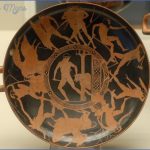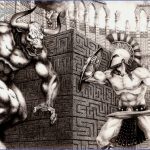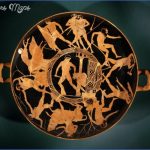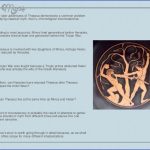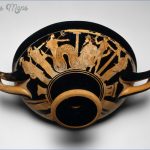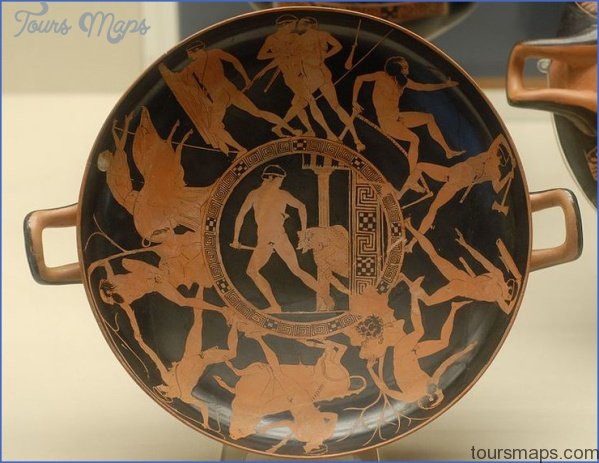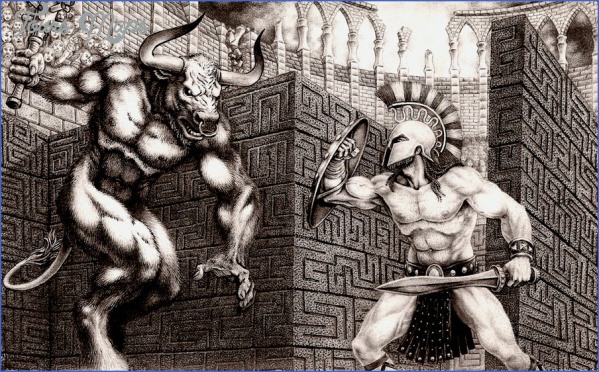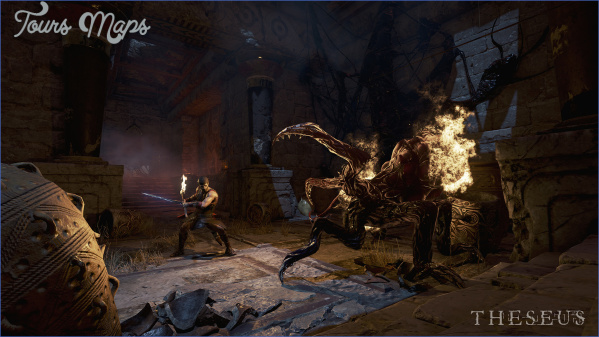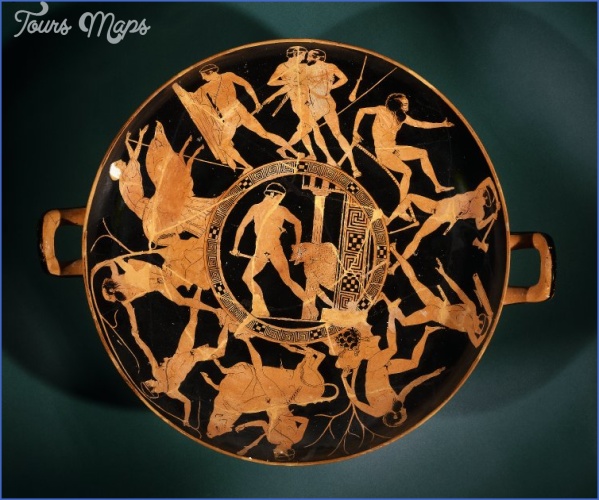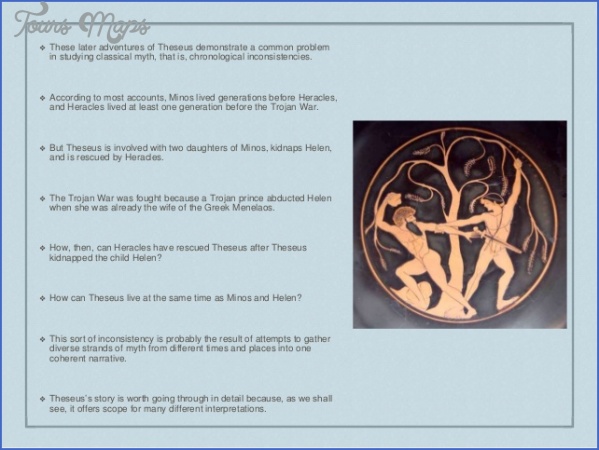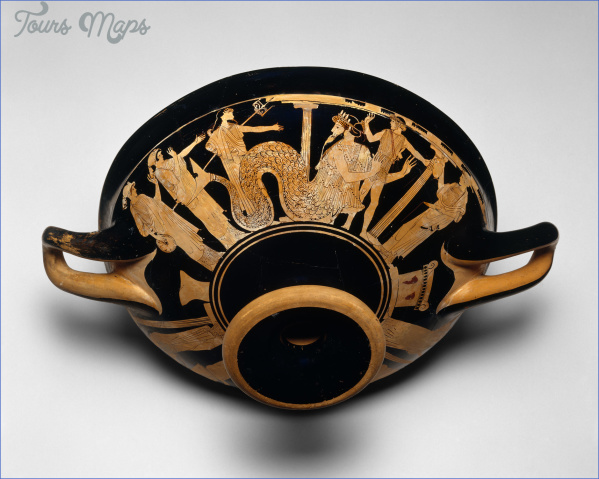Aegeus, Father of Theseus
The greatest Athenian hero was Theseus. For many years childless, his father, Aegeus, son of Pandion, had tried everything, even introducing into Athens the worship of Aphrodite, the mistress of procreation – but to no effect. Perhaps, he mused, thanks to the murderous behaviour of his sisters, Procne and Philomela, he was accursed, so he consulted the Delphic oracle. Its reply was enigmatic: ‘Do not unstop the swollen wineskin until you return to Athens. ’
Perplexed, Aegeus resolved to take counsel from his friend, the king of Troezen, Pittheus son of Pelops. On his way (tells Euripides) he stopped at Corinth, where Medea had recently discovered that Jason had abandoned her. Utilizing her charms to the full, Medea persuaded Aegeus (ignorant of Medea’s planned revenge) to grant her asylum in Athens.
In Troezen, Pittheus readily understood the oracle: Aegeus should refrain from sex until returning home. But rather than reveal the explanation, he sent Aegeus to bed drunk, then instructed his daughter Aethra to join him It was an eventful night. No sooner had Aethra slept with Aegeus than she waded over to make offerings on the nearby island of Hiera, where (at the unmaidenly suggestion of Athene) Poseidon ravished her. Next morning Aegeus hid his sword and sandals under a massive rock, instructing Aethra that if, as a result of their dalliance, she bore a son strong enough to shift it, she should send him to claim his patrimony. Back in Athens Aegeus found Medea already in residence. Bewitched by her beauty, he married her and fathered a son called Medus, whom they raised as Aegeus’ heir.
The Adventures of Theseus Photo Gallery
Aethra too bore a son, and named him Theseus. Pittheus encouraged rumours that the boy’s father was Poseidon, leaving Theseus ignorant of Aegeus’ role in his conception. But when he reached adulthood, Aethra showed him the rock where Aegeus had hidden the tokens of his identity. Theseus easily lifted it, so she revealed the truth and bade him go to Athens; but rather than cross by sea Theseus tested his manliness by travelling overland, where (in feats of civilizing heroism mirroring the exploits of Heracles) he rid the countryside of notorious brigands.
Theseus turns Procrustes’ axe on its owner, who squirms on his infamous bed. (Attic red figure vase, c. 425 BC.)
At Epidaurus a lame one-eyed beggar, Hephaestus’ son, Periphetes, attacked passing travellers with a bronze-bound club. Theseus tricked him by asking if – before Periphetes killed him – he could examine the club to ensure that the binding really was bronze. When Periphetes swaggeringly handed over the weapon, Theseus smashed it over the beggar’s head. Then, keeping the club, he continued on his way.
At the Isthmus of Corinth lived Sinis, a ruffian who killed passers-by with the aid of pine trees. He had two techniques. One was to ask the traveller to take hold of a tree’s top branches and help him bend the trunk down to the ground – at the last moment Sinis would release his grip, catapulting his victim to his death. His other speciality was to overpower the traveller, tie him to two pines, which he had first secured in place, then cut the ropes – as the trees whipped upright, they tore the victim apart. This was the method Theseus used to despatch Sinis (after first defeating him at wrestling), thereby rendering the Isthmus safe.
Near the summit of high sea-cliffs, Theseus’ path was blocked by Sciron, a towering figure seated on a rock, who forced everyone who passed to wash his feet. As they crouched before him, he kicked them over the cliff edge on to the jagged rocks below, where a turtle feasted on their raw remains. Theseus paid the bully in his own currency. The last bones the turtle chewed were Sciron’s own.
At nightfall Theseus arrived in Attica and, breasting the final hills, he came to a roadside inn. Its landlord, Procrustes, possessed an iron bed, which he insisted should prove a perfect fit for every guest: if a visitor were too short he stretched him, while if he were too tall he sawed off those extremities which overhung the bed’s iron frame. (Alternatively he used two beds: a long one for short people, a short one for tall.) Turning the tables on his vicious host, Theseus rid Greece of another deadly scourge.
Once in Athens, Theseus did not immediately reveal his true identity. But, as soon as she met him, Medea knew who he was. Determined that this interloper should not usurp her son, she persuaded Aegeus that Theseus was an enemy and prepared a poisoned drink. As Theseus took it, Aegeus recognized the sword he was wearing in his belt. Instantly he dashed the cup from Theseus’ lips, and both watched in shocked fascination as the spilt wine caused the paving stones to melt and bubble.
While Aegeus introduced Theseus to Athens as his heir with sacrifices and a sumptuous banquet, Medea fled, travelling with her son far to the east. Here (in modern Iran) Medus gave his name to the Medes, a people whom Herodotus records were until then called Aryans. In historical times, many Greeks used the name Medes to signify the Persians.
Theseus found Athens riven with dispute. Another branch of Erechtheus’ family, the fifty sons of Pallas, were challenging Aegeus’ rule. Attica was on the brink of civil war. Skilfully Theseus negotiated a temporary peace, though he was later forced to go to war and kill all Pallas’ sons. Before that, however, Theseus turned his attentions to an external threat. He had already slain the Cretan bull, which Heracles had brought to Tiryns and let loose to roam the mainland; now, to rid Athens of the tribute it was forced to pay King Minos of Knossos, Theseus set out on a voyage to Crete with thirteen companions. His mission: to kill the Minotaur.
Maybe You Like Them Too
- Theseus & Peirithous
- The Voyage of the Argo Begins
- Minos, his Loves & his Family
- The Centaurs
- Athens in History & Today


